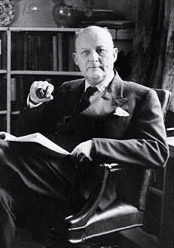
Reinhold Niebuhr was a Protestant theologian best known for his study of the task of relating the Christian faith to the reality of modern politics and diplomacy. He thought of himself as a preacher and social activist, but the influence of his theological thought on the field of social ethics and on society made him a significant intellectual figure. As minister of Bethel Evangelical Church in Detroit in 1915, he personally witnessed the working-class realities of American automobile industry laborers. His criticisms of the inhumane treatment of factory employees in the Ford Motor Company plants made him an outspoken advocate for the rights of workers in social and economic matters. He was also an outspoken critic of the Ku Klux Klan, which he concluded was “one of the worst specific social phenomena which the religious pride of peoples has ever developed.” From 1920 until his retirement in 1968, he taught applied Christianity (later Ethics and Theology) at Union Theological Seminary in New York City. During his lifetime, Niebuhr was the best-known Christian intellectual in the United States. A prolific writer as well as a popular, engaging speaker, Niebuhr became a national celebrity and influenced Martin Luther King, Jr. and policy makers in the administration of President John Kennedy. He was awarded the Presidential Medal of Freedom in 1964.
Image: Photo of Reinhold Niebuhr, writer and political activist
“I think there ought to be a club in which preachers and journalists could come together and have the sentimentalism of the one matched with the cynicism of the other. That ought to bring them pretty close to the truth.”
“Real religion produces the spirit of humility and repentance. It destroys moral conceit.”
“Humor is a prelude to faith and laughter is the beginning of prayer.”
“The final wisdom of life requires not the annulment of incongruity but the achievement of serenity within and above it.”
“The tendency to claim God as an ally for our partisan value and ends is the source of all religious fanaticism.”
“A wise architect observed that you could break the laws of architectural art provided you had mastered them first. That would apply to religion as well as to art. Ignorance of the past does not guarantee freedom from its imperfections.”
“Nothing worth doing is completed in our lifetime,
Therefore, we are saved by hope.
Nothing true or beautiful or good makes complete sense in any immediate context of history;
Therefore, we are saved by faith.
Nothing we do, however virtuous, can be accomplished alone.
Therefore, we are saved by love.
No virtuous act is quite a virtuous from the standpoint of our friend or foe as from our own;
Therefore, we are saved by the final form of love which is forgiveness.”
– Reinhold Niebuhr (1892-1971)
